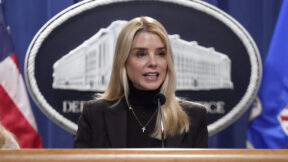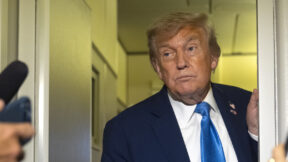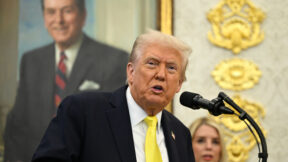GELF “Overlooked Women In Media” Panel, September ’09 (VIDEO)
“Overlooked Women In Media:” Transcript
Rachel Sklar: There are two upcoming new panel series; Media Circus and Geek Town. I of course clicked on it, perhaps with an agenda, and I immediately noticed that both panels were all men. This is something I’ve started to notice in my time as a media columnist, and its always irritates me a little bit. So I fired off an email back, saying “Gee, I had no idea there were no women in media or science.” And what that kicked off was a bit of an email back and forth where I, a little feistily, started zinging names of great people who happen to be women they had overlooked, and Michael Gluckstadt came back at me with an apology and an invitation to put together a panel to basically put my money where my mouth is.
And it was pretty genius, as it was basically delegating the panel situation to me, but I did it and I’m really happy to have this opportunity to talk about this. This is not “just a chick” issue and I’m really happy to see that there are guys here too. I think it’s a content issue: I think being a woman I might have an interesting perspective on things, and any general interest publication suffers from a lack of diversity and perspective. So that’s the sort of thing we’re going to be talking about. It’s not an issue of women not being represented in the media, because women are well represented in the media. My issue has always been this “unofficial quota” feel of panels, conferences, and lists…like “the best list” or “the hot list,” invariably it’s mostly men, it’s all men, or it’s a token female and I notice that stuff. And since I make a lot of these lists at MediaIte, I know you’re making them half for authenticity and half for buzz and half to think outside the box. And part of it is just trying to get people to think that way, to have it occur to them, because I know for me I’ll see a top ten list, and I’ll see one woman on it and that will strike me. And a guy reading that same list won’t notice, and there’s not something wrong with his not noticing, its just that he hasn’t any reason to.
So that’s sort of what this is about, opening up that discussion and seeing why that tends to be. So without further ado, I’m going to introduce the ladies of the panel: first we have Glynnis MacNicol, I don’t know if any of you read Mediaite.com, but I slightly know her from that publication — we actually worked together for a time at The Huffington Post and she is the senior editor at Mediaite. She’s the person that is up at five thirty scouring Twitter and various news feeds to make sure that we leave no stone unturned. She was also formerly the editor at FishbowlNY and prior to that she worked in publishing as a book scout, so she brings a wealth of experience to this. And this is also something we discussed a lot: we covered the campaign together and maybe noticed a little bit of sexism about Hillary Clinton, maybe just a little bit. Next we have Anna Holmes who is the editor and chief of Jezebel.com, Gawker Media’s “women-related” blog. Jezebel is a fantastic, fantastic blog and community. I have to say that I’ve gotten a lot of servicy information from the blog. They are very frank and they’re honest and they do a great job over there. Next is Caroline McCarthy who is the blogger at The Social for CNET. She covers social media for them and she not only finds herself frequenting panels such as this, but in covering the industry she invariably notices the preponderance towards news makers being male and that spotlight shined on men, and we thought she’d be a good perspective to have. And then we have Jessica Grose: Jess is the managing editor of Double X, the new blog at Slate and she is also the co-author of Postcards From Yo Mama (that’s actually the blog name, the book is called “Love Mom.”) And the book did very well, it was impossible to miss some of the coverage of it when it came out, it was very well covered.
What I’m going to do is throw this out as a first general question to the panel: Am I off-base? Am I paranoid and just looking for problems where none exist?
Glynnis: I think the short answer to that is no, you’re not paranoid. I think when you mentioned covering the presidential campaign, that was a turning point for me. When Hillary Clinton started running I don’t think I was paying very close attention to how she was being covered: she was the senator of New York and she was just sort of there. As we got closer to the primary, the whole crying episode I think was a real turning point for me being suddenly super-aware of how differently people were referring to her. It made me much more sensitive to how women were represented, how many women were represented, and whether or not we were fairly represented in the media. And Jezebel watched it to, I don’t think I was aware of the lack of that voice until it appeared, and it suddenly seemed very necessary and I was amazed it hadn’t been there before. When did Jezebel launch?
Anna: May 2007.
Glynnis: Right so it almost strangely coincided together (Clinton running and Jezebel launching) and both very much impacted my awareness of what was going on.
Anna: Rachel, I know that when you asked it in an email to us, my first thought was “Why would you question yourself?” Why would you even say “Am I paranoid?” Because to me there is no doubt of course – well, like you said I’m not sure if women are not represented in media, they tend to be shoved into certain places. I know a lot of women in media, I’ve worked in media since I got out of college in ’95, and the majority of women I know tend to work in focused women-focused media. I’m not making a judgment call about that, I run a site that’s female focused media but I think female focused outlets aren’t taken as seriously. I think if you look on mastheads of the magazines that are taken very seriously as the voices of America, American intellectualism etc, they tend to be male. To go back, I think you’re asking the question of “are you paranoid” is a symptom of the fact that we do see women in media, but we don’t see them in a lot of positions of power. I don’t want to make judgment calls about women in media who are running female-focused media outlets, but I do think in larger culture they aren’t taken very seriously or as seriously. Maybe that’ll change. I hope it changes. I know there’s certainly a lot more female-focused media outlets than there used to be, Jessica’s site just launched several months ago, and I hope to see more of that. But for most part women I know work at women’s magazines.
Rachel: Anna reminded me, there used to be this site run by woman from Glamour called WomanTK that kept track of portions of bylines and masthead presences of women versus men at big general interest magazines like Harpers, The New Yorker, The Atlantic, Vanity Fair. The result was invariably 6 to 1, 5 to 1, 4 to 1, the result being stark of that imbalance of representation.
Caroline: In debates like this I’m often the contrarian, because I am employed in a field of journalism where the majority of people we cover are male, and the majority of our readers are male, but the majority of people writing about it -I would say it’s not split down the middle- but about half of the newsroom at Cnet are female, and then among my competitors, about half of them are female as well. I was actually psyched to be thrown into this male-dominated industry because I went to an all girls school for 10 years, and felt the brunt of how horrible girls can be to each other. A big turning point for me was when I covered the Wired business conference, which was a very high-profile buttoned up conference that Wired magazine threw earlier this summer at Morgan library. It was effectively Wired’s pitch to the non-tech business world. They had a lot of executives from very forward-thinking companies- alternative energy companies, tech companies, new media companies – speaking to an audience that was largely a lot of guys in suits from industries in New York hit hard by recession, looking for some sort of insight. It was a full day conference, not one woman on stage all day, and that really offended me. I knew they’d be speaking to a lot of executives in New York, who tend to be male, and I knew that the industries they were pulling on stage were male-dominated as well. But to think that this is what Wired is trying to put forth to New York as the future of business, and business ideas that you should listen to: it was really sort of an expose of what they saw as the future of business and for them to not put a single woman on stage was incredibly backwards and very offending. It’s not a matter of looking for a token female in that sense, and in other contexts where someone would ask “Well why aren’t there more women in this?” I would say it’s sort of a reality, there are a lot of people trying very hard to get more women in engineering and computer science and it’s only progressing slowly. So I’ve been sort of accepting of the fact that things are going to be male-dominated, but that one conference for me was too much. I actually wish I had the chance to do an opinion piece on it, but for some reason I let that chance go by.
Jess: Just to piggyback what Caroline said, I always think of it as this chicken or an egg problem, because all women I knew who were going into media after college, all of us went into what is seen as the fluffier side of things which are the arts and leisure, not politics not tech. Which is not to say we are not ambitious or interested in these things, but that at some point we were given a message that we shouldn’t pursue those things. Because I know women now who have pursued those things and have become quite successful at it. I really don’t think in some ways that women aren’t being kept away from these things if they go over after them to pursue, I think that the real problem is more systemic: why aren’t women pursuing these things in first place? Like Caroline says, 50 percent of her newsroom is female, so it depends on what media you’re talking about. Lumping it all together doesn’t quite work. I don’t have an answer to these questions, where are women getting these messages, why we think we can’t participate in these intellectual discussions, but I’ve certainly noticed it and I don’t think you are crazy.
Rachel: I’m going to pick up on that, because (the topic) switched from something that was an outward view imposed upon women, to how a woman can participate in media. This is something I’ve only seen anecdotally and might be my problem personally, but there seems to be an imbalance in the tendency of women to “show up”, i.e. to write the post, send the email- show up to that thing, you’re there. Even when putting out the call for columnists at MediaIte, what I actually got back were mostly men. What explains that? Is that something that just I’ve noticed or is this pandemic?
Jess: Especially for young women, what they get positive feedback for and what they are encouraged to do (and this again a blanket generalization) is often first-person writing, not these thinky, reported pieces. Courtney Martin wrote a piece about it, I think it might have been in the American Prospect, on how she had pitched this reported piece on the women in Kenya, and the editor said “Well this is really okay, but can you do it from your point of view and can you really reveal these things about yourself?” I think that is what women are rewarded for at young age, and that’s where they are shunted off into. Of course you can fight against that and refuse to write the piece, but it’s the things you can get published so why wouldn’t you keep giving them what they want, that’s the goal, to get published. So that’s one of the problems for women starting out: this packaging of yourself and your voice is much more scrutinized than it is for young men.
Caroline: There are a couple different angles you can take on this: A lot of times in the industry and at tech conferences, I’ve turned down invitations to be on panels because I don’t want to be over-exposed. I see this especially in the tech industry although I’m sure it applies to other industries as well, you got people go on panel after panel, most of them men that don’t have that many legitimate accomplishments and come across as blowhards. I think that many women, myself included, don’t want to make themselves all that public and be these aggressive business voices that don’t have that much credibility to them. On other hand, I also see at various panels and speaking appearances on TV and at conferences, people pulled into panels because they need a girl. And sometimes the people they chose as their token female are chosen because they are female in an industry that is mainly male, be it web developers or engineers or whatnot. And oftentimes because the pickings are slim the women doesn’t do well; is not a good speaker, perhaps not as accomplished as men on panel, they were almost scraping the bottom because it’s simply a male-dominated industry. That’s very counter-productive: if you have a panel of four web developers and one is female, and she doesn’t know what she’s talking about and is several levels below the men on the panel, I’d rather have the panel be all male. Simply having someone on the panel because she’s female and she can’t compare is not good for women in the industry and in the media. I think the real problem is getting women up to that level, and I think that there are women that are overlooked, that don’t get pulled into public-eye circuit, and so as a result you get couple regulars who might be well-known names, easy for conference organizers to call up but aren’t actually that good at what they do. That gets more to root of what Rachel talking about with there being women in the industry that are great but people don’t know about. Instead they keep dialing up the same people for CNBC or to be on a panel at the Web 2.0 expo that are not good for women in media as a whole.
Rachel: It’s true: the bookers find someone they like and will stay with you. I remember the day I was asked to talk about super-delegates, and this was the first election I covered, but I said yes because I had been previously told by someone who knew someone at SheSource, which addresses women and getting out there, that odds are men will never turn down that kind of request. They’ll never say “I could never talk about that” or “I don’t know enough about it” whereas when I first started going on television, I would get requests and would be like “You know, I don’t think I know enough about that to talk about it credibly.” So I agreed to talk about super delegate math, I did my research and I showed up and was prepared. But it’s not because I had any particular expertise in super delegates, so I have definitely been part of that problem.




